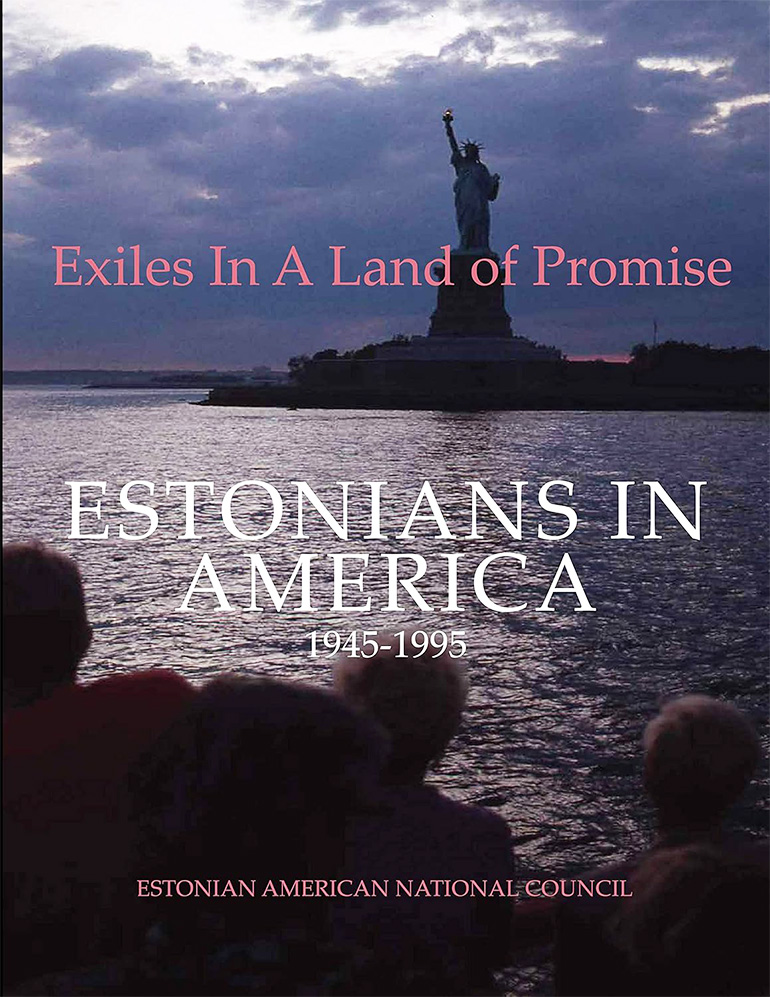The influence of the past reverberates to the present
Marju Rink-Abel, who was born in the Geislingen refugee camp and whose godfather was Karl Ristikivi, writes about her family story and also about how she has kept Estoniani spirit while living in the USA.
My mother, Hildegard Rink, née Romet, was from Narva, where her father had a home-based knitting workshop. Her father was disabled due to injuries sustained in World War I while serving in the Tsarist army. To support his seven-member family (four children, wife, wife’s mother, and himself), he established a knitting business in their home in Narva. The business began to thrive, and it enabled him to send my mother, who was the youngest, to the University of Tartu, where she studied Estonian language and philology. When the Soviet troops arrived, my grandfather was called in for interrogation and disappeared without a trace. His name, August Romet, was added this year to the Memorial to the Victims of Communism in Maarjamäe, Tallinn.
My father, Evald Rink, was from a farm near Kadrina. As the second son in the family, he received an education rather than inheriting the farm. He graduated from the University of Tartu as a historian and worked at the National Central Archives. He had an older brother and a younger sister, who fled with him. My parents met in Tartu, where both were members of the Estonian Students’ Society Veljesto, which brought together those interested in literature and culture and emphasized Estonian values.
Among the more well-known members of the society were Harri Moora, August Annist, Ants Oras, Aleksander Aspel, Bernard Kangro, Julius Mägiste, Heinrich Mark, Karl Ristikivi, Paul Ariste, and later Ivar Ivask, who joined in exile. Thanks to my parents’ connections, I had the opportunity, as a young person spending an academic year in Helsinki after graduating from university, to visit several of the individuals mentioned here. I met my godfather Karl Ristikivi twice in my life – once in Sweden and another time at my parents’ home in Wilmington, Delaware, where he stayed during a North American tour. I must say that I was deeply impressed by the Veljesto members both as individuals and also by their knowledge and accomplishments as representatives of the intellectuals of the Republic of Estonia. I believe that this understanding positively influenced my future endeavors and my view of the Republic of Estonia.
My permanent residence in the U.S. is in Kensington, Maryland, just outside the capital, Washington, D.C. I have lived in that area for 50 years, which has allowed me to be active in the fight abroad for Estonian re-independence as well as in political lobbying. I served on the board of the Washington Estonian Society from 1980 to 1988 and was chairman for five years. During that time, the situation in Estonia began to change, and we organized demonstrations and meetings with members of Congress, their staff, and the State Department in support of dissidents. I was elected to the Estonian American National Council (EANC) in 1989 and have been a member ever since, serving as chairman for over 17 years, a position I stepped down from last fall.
The EANC was founded on July 19, 1952, in New York by post-World War II refugees. It was established out of the need to create a unified national organization to unite and lead Estonians living in exile in the U.S. The goal was to coordinate the fight against communism and for the liberation of Estonia, as well as other nations trapped behind the Iron Curtain. With Estonia’s re-independence, the EANC’s focus shifted somewhat, now concentrating on supporting Estonia’s security and stability while continuing to preserve, protect, and promote Estonian heritage, culture, and values in the United States. The EANC played an important role during the transition period, officially demanding the legal continuity of the Republic of Estonia. The EANC also urged the U.S. Congress to demand the withdrawal of Soviet troops from Estonian territory and requested that the U.S. government assist in rebuilding all key areas of the new democratic government. NATO expansion was another important achievement, actively promoted not only by Estonians and other Balts but also by other national groups from Eastern and Central Europe, with whom the EANC collaborated.
The EANC has a proud history of supporting and representing the Estonian community in the U.S. The EANC’s 555-page English-language history of Estonian Americans, Exiles in a Land of Promise: Estonians in America 1945–1995, provides a comprehensive overview of Estonian activities across America, including organizations, societies, politics, locations, communities, culture, music, and literature. Although some activities have diminished, much continues to this day. The EANC remains active in supporting projects and events, including films, books, and, last year, the U.S. tour of the Estonian Philharmonic Chamber Choir. The EANC is a non-profit organization supported by voluntary donations from the Estonian-American community. I should mention that my work, along with that of others over the years, has been voluntary and unpaid.

The EANC is also connected with other organizations, where I have been its representative. The Baltic nations are represented in Washington by the Joint Baltic American National Committee (JBANC), which has established valuable contacts and many achievements over the years. The EANC is also a founding member of the Estonian World Council (EWC). I have served as chairman of this organization and am currently vice-chairman. The EWC’s committee for commemorating the 1944 mass flight is organizing this year’s events. The highlight will be the unveiling of a memorial on the banks of the Pärnu River, a gift from the Estonian diaspora, on September 21 of this year.
I am pleased that the connection with Estonia remains strong, thanks to the Global Estonian Cooperation Commission, led by the Estonian Ministry of Foreign Affairs. Soon, a new multi-year plan will be developed, hopefully outlining greater and stronger collaboration on a global scale. I wish this effort success, good fortune, and fruitful cooperation!

Marju Rink-Abel
The Estonian American National Council, Council President 2006-2023
The Estonian World Council, Vice President







